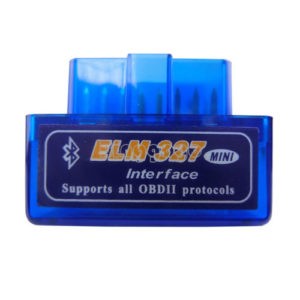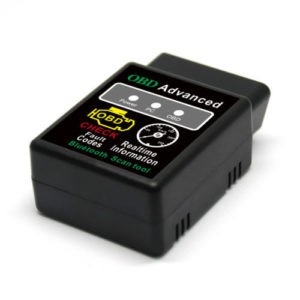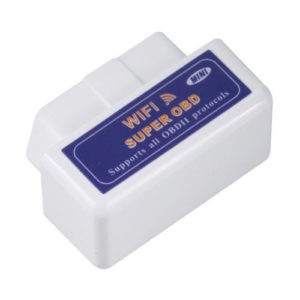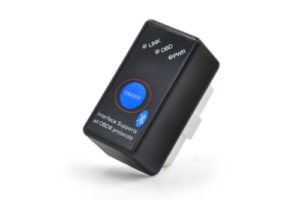The ELM327 OBD2 adapter is the linchpin for seamless communication between car diagnostic apps and your vehicle’s control unit. Whether you’re a seasoned mechanic or a car owner keen on understanding your vehicle’s health, selecting the right Obd2 Bluetooth Adapter is crucial. It dictates not only the ability to connect to your car’s systems but also the quality and reliability of that connection.
If you’re looking for a quick recommendation on which adapter to buy and where, feel free to jump directly to our recommendations. However, understanding the nuances of these adapters will ensure you make an informed decision and avoid common pitfalls.
Understanding ELM327 OBD2 Adapters
When diving into the world of ELM327 adapters, two key considerations emerge: compatibility and quality.
Firstly, compatibility hinges on the adapter’s connection type and its alignment with your smartphone or tablet’s operating system. Secondly, quality is paramount. A high-quality adapter should reliably perform its diagnostic tasks without glitches or freezes, effectively serving as your car’s voice. Unfortunately, the market is saturated with subpar adapters that can lead to frustration and misdiagnosis.
Connection Types: Bluetooth, Wi-Fi, and More
OBD2 adapters connect wirelessly using various technologies. Understanding these differences is key to choosing the right one for your device.
-
Wi-Fi Adapters: These create their own wireless network for your device to connect to.
-
Bluetooth (Classic) Adapters: Utilizing older Bluetooth standards (1.x, 2.x, 3.x), these are widely compatible with Android devices.
-
Bluetooth Low Energy (LE) Adapters: Based on Bluetooth 4.0 and later, these are energy-efficient and essential for iOS devices due to Apple’s restrictions on classic Bluetooth for OBD2 adapters.
-
Bluetooth MFi Adapters: These are classic Bluetooth adapters certified by Apple under the MFi (Made for iPhone/iPad) program. Due to Apple’s stringent requirements and associated costs, these adapters are less common but offer reliable compatibility with iOS. Examples include OBDLink MX+ and vLinker FS. On Android, they function as standard Bluetooth adapters.
-
USB Adapters: While not covered in this article, it’s worth noting that USB OBD2 adapters exist but are not compatible with most mobile car diagnostic apps like Car Scanner, which focuses on wireless connectivity.
The optimal choice depends heavily on your smartphone or tablet’s operating system.
Choosing for Apple iOS (iPhone/iPad)
Apple’s iOS ecosystem, used in iPhones and iPads, presents specific compatibility requirements. iOS Car Scanner apps primarily support Bluetooth LE (4.0), Wi-Fi, and Bluetooth MFi adapters. Classic Bluetooth adapters (versions 1.x, 2.x, 3.x) are fundamentally incompatible with iOS due to operating system limitations. This is a crucial point often missed by users, leading to purchase errors.
Recommendation for iOS: Bluetooth LE (4.0) adapters are generally the best choice for iOS users. They strike a balance between ease of connection, acceptable data transfer speeds, and availability. For users needing top-tier performance and speed, Bluetooth MFi adapters are an option, albeit at a higher price. Wi-Fi adapters, while compatible, can sometimes lead to more complex connection setups and potential conflicts with mobile internet access.
Bluetooth Version is Critical for iOS: It cannot be overstated how important it is to verify the Bluetooth type when selecting an adapter for an iPhone or iPad. Many users mistakenly purchase classic Bluetooth adapters, only to find they are completely unusable with their iOS devices. This limitation is inherent to iOS architecture and cannot be circumvented by any app.
Choosing for Google Android
Android’s open ecosystem offers greater flexibility in OBD2 adapter compatibility. Android devices support classic Bluetooth (versions 1.x, 2.x, 3.x), Bluetooth LE (4.0), and Wi-Fi adapters. For Android users, classic Bluetooth adapters are often recommended. They typically offer faster data transfer rates compared to Bluetooth LE and a more robust connection than Wi-Fi. A significant majority of Android users successfully utilize classic Bluetooth OBD2 adapters.
However, a minor drawback exists: some Android devices may experience issues when managing multiple simultaneous Bluetooth connections, such as an OBD2 adapter and a car’s Bluetooth multimedia system. This is a device-specific limitation rather than a general Android issue.
Quality Matters: Decoding ELM327 Adapter Versions and Chips
Forget outdated notions about adapter versions, specific chips, or circuit board counts. This information is largely irrelevant to adapter quality today. Claims about “version 2.1” or particular chips (like PIC) are often misleading marketing tactics. Both good and bad adapters exist across various versions and internal components. Chinese manufacturers have become adept at counterfeiting these indicators on low-quality adapters, while others produce reliable adapters using different chips. The version number on many clone adapters is simply arbitrary text, easily customized.
Instead of focusing on these misleading metrics, concentrate on the fundamental aspect: adapter quality. A quality ELM327 adapter simply works reliably, without glitches or freezes. Your primary goal should be identifying and purchasing such a dependable adapter. Conversely, “bad” adapters are plagued with numerous problems.
The Pitfalls of “Bad” ELM327 Adapters
Purchasing a low-quality ELM327 adapter can lead to a range of frustrating and potentially problematic issues:
-
Complete Non-Functionality: The adapter might simply fail to connect or operate at all.
-
Unstable Operation: Intermittent freezes, spontaneous reboots, or temperature/humidity sensitivity can render the adapter unreliable. Connectivity may be inconsistent, working one day and failing the next, or only partially functioning.
-
Limited Command Support: Substandard adapters may only support a subset of essential diagnostic commands, despite falsely claiming full compatibility.
-
Fixed ECU Address: Some faulty adapters are hard-coded to communicate with a single, standard ECU address, preventing access to other control units in your vehicle.
-
Request/Response Length Limits: Limitations on data packet size can hinder comprehensive diagnostics.
-
Data Loss: Incomplete data transmission, where packets are dropped during communication, leads to corrupted and unusable diagnostic information.
-
Data Distortion: Data corruption during transmission can result in sending incorrect commands (e.g., accidentally initiating memory erasure instead of a temperature request) or receiving inaccurate readings.
-
Protocol Incompatibility: Limited protocol support means the adapter may only work with specific vehicle communication protocols, failing to connect with cars using unsupported protocols.
-
On-Board Network Interference: Faulty adapters can inject “noise” or junk data into the car’s communication network, disrupting the ECU’s primary functions and potentially causing engine performance issues like roughness.
-
Critical Failures in Advanced Functions: For users interested in advanced features like ECU coding and service functions, a high-quality adapter is absolutely essential. Data writing to the ECU is a sensitive process, and a poor adapter can lead to data corruption, failed operations, or even severe ECU damage.
 bad elm1-1
bad elm1-1
 bad elm2
bad elm2
 bad elm3
bad elm3
 bad elm4
bad elm4
 bad elm5
bad elm5
The Overwhelming Problem: The market is unfortunately flooded with more bad ELM327 adapters than good ones. It’s not uncommon to purchase multiple adapters in search of a reliable unit, highlighting the challenge in finding a quality OBD2 Bluetooth adapter.
Recommended OBD2 Bluetooth Adapters
To help navigate this challenging landscape, here are some recommended OBD2 Bluetooth adapters, categorized roughly from most to least expensive, based on experience and user feedback:
-
OBDLink MX+ with Bluetooth MFi (Amazon Link): Around $100 USD. Compatible with both iOS and Android. This is a top-tier, advanced adapter offering exceptional performance.
-
OBDLink CX with Bluetooth LE (Amazon Link): Approximately $80-100 USD. iOS and Android compatible, featuring a large memory buffer and excellent overall performance.
-
vLinker Series (Amazon Link for vLinker):
- vLinker MC+ with Bluetooth LE (Amazon Link)
- vLinker FS with Bluetooth MFi (Amazon Link)
- vLinker MS with Bluetooth MFi (Not directly linked, search on Amazon)
- vLinker has emerged as a strong contender, initially with some firmware issues but now offering very reliable adapters, especially after firmware updates. MC, MC+ (Bluetooth LE), FS (Bluetooth MFi), and MS (Bluetooth MFi) are recommended for iOS. Any vLinker adapter is generally a good choice for Android. Remember to prioritize Bluetooth for Android and Bluetooth LE for iOS, and check for firmware updates from the manufacturer.
-
Vgate iCar Pro 2S: A newer, improved version replacing the iCar Pro BLE. It’s a solid upgrade and the preferred choice over the older iCar Pro BLE.
-
Vgate iCar Pro BLE (Amazon Link): Features both Bluetooth 2.0 and Bluetooth 4.0, ensuring broad compatibility with iOS, Android, and Windows. Note: Older firmware versions (prior to v.4.1.02, 2021/01/08) had issues with CAN Extended addressing in Toyota and BMW vehicles. Firmware updates are crucial for optimal performance. Firmware updates can be downloaded here.
Adapters to Avoid – Buyer Beware!
Steer clear of these problematic OBD2 adapter types and brands:
-
xTool Adapters: These are proprietary and incompatible with the ELM327 standard, only working with xTool’s specific software.
-
Wired (USB, COM) Adapters: Car Scanner and similar mobile apps are designed for wireless adapters.
-
“Mini” Adapters: Adapters marketed as “mini” are overwhelmingly likely to be low-quality.
-
Extremely Cheap Adapters: Significantly low prices are often a red flag for poor quality.
-
Adapters with MAC Addresses Starting with 11:22:33 or 00:00:00: These MAC addresses are common indicators of generic, unreliable clones.
-
KONNWEI Devices: While previously recommended, KONNWEI adapters have experienced a decline in quality and are now prone to data packet loss.
-
“Micro Mechanic” Adapters: Many users report these adapters failing after only short-term use.
-
“THINMI.COM” Adapters: These often have limited ELM327 command support and generate fake responses.
-
KUULAA Brand Adapters: Known for inconsistent performance and reliability issues.
-
Adapters Resembling the Images Above: While visually similar adapters may exist, the specific designs shown in the images are frequently associated with low-quality components and unreliable performance.
Disclaimer: As an Amazon Associate, I earn from qualifying purchases through the provided Amazon affiliate links. Recommendations are based on experience and Car Scanner user feedback and are intended to guide you toward reliable OBD2 Bluetooth adapters.